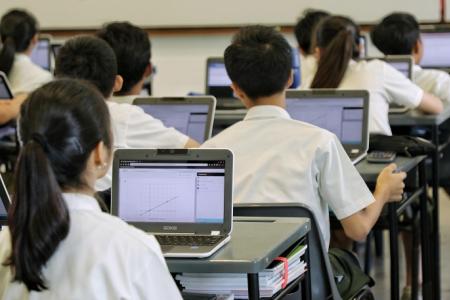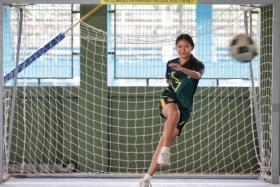Are school-issued iPads, Chromebooks a distraction in class?
Eighteen seconds spent on Google Classroom and more than three hours on entertainment apps like YouTube and TikTok. This was what parents discovered about how their 13-year-old son had been using the school-issued iPad during school hours.
The Secondary 1 student, from Gan Eng Seng School, admitted to his parents that more often than not, he had not been paying attention during lessons as he had been playing online games on his iPad under the table in the classroom.
All secondary school students have received such school-sanctioned tablets or personal laptops since 2021, after the Ministry of Education (MOE) brought forward its original 2028 target by seven years. Online learning became more prevalent during the Covid-19 pandemic, and schools have begun to introduce regular home-based learning.
Schools select from a range of device types – mostly iPads or Chromebooks – and the intent is for all students in the school to be using the same device, for lessons and assignments on online platform Singapore Student Learning Space (SLS), both at home and in classrooms.
But not everyone is in favour of having access to screens in school.
At least eight parents told The Sunday Times that they feel the personal learning devices (PLDs) have caused more distraction in the classroom instead of enhancing learning, and several teachers said they often catch students checking messages or playing games.
Some parents from Gan Eng Seng School said their children have been constantly distracted by their PLDs during lessons since receiving them in April.
The parents said their children would typically spend three to four hours on non-educational activities on their iPads each day in school, based on screen time checks.
These include browsing Instagram and TikTok, using messaging apps like WhatsApp, and taking photos of their teachers and classmates. Some students would plug in their ear buds, move to the back of the classroom and listen to music on Spotify or watch videos on YouTube.
One parent said her child was able to play an online soccer game for five hours while in school.
Most of the parents spoke on condition of anonymity and did not want to reveal personal details for fear that their children would be singled out in school.
All PLDs are pre-installed with a device management application, like Mobile Guardian or Blocksi, that blocks students’ access to undesirable internet content, such as pornography and gambling, and sets screen time limits.
But parents said students had previously been able to bypass the pre-installed device management apps.
A secondary school teacher said students in her form class in 2021 – among the first batch to receive PLDs – already knew how to get around restrictions.
“Within a few days, I saw that they had figured out how to use various chat, entertainment and gaming apps on their devices. Many would then choose to stay back in class to use their Chromebooks during recess and lunchtime, instead of going down to the canteen to eat and socialise.”
Mr Andrew Soo, 50, a nurse, said he and his wife set limits on the use of their two sons’ PLDs at home, but they have no control over usage when they are in school. He declined to reveal the names of their schools.
YouTube and game websites are accessible on their PLDs, he said, even with Mobile Guardian installed. He prefers to install his own parenting software but cannot because of Mobile Guardian.
Both boys, 15 and 17, have their own mobile phones, but Mr Soo uses Google Family Link to restrict their usage, so they can use their phones only for WhatsApp and listening to music.
His younger son was eventually referred to a school counsellor to help manage his iPad usage, and has managed to reduce his screen time since.
Another parent said her son was able to reset parental controls on his school-issued iPad by creating another user account on the device and using that to log in.
“The kids find out how to reset the factory settings, and then we have to start all over again. I feel like trust has been lost, and it has impacted relationships in the family,” she said.
Parents say the guide given to them on activating parental controls is not enough to thoroughly understand how to manage the PLDs effectively. There are also so many permutations and possibilities when it comes to setting controls.
Responding to queries, an MOE spokeswoman said the PLD initiative aims to provide opportunities for secondary school students to develop digital literacy and technological skills, as well as good digital habits for an increasingly tech-saturated environment.
To ensure that the PLD is used safely and responsibly during school hours, schools have standard operating procedures and classroom routines to guide student behaviour, as well as teacher-led instructions, she said.
Self-regulation increases with maturity and adult teaching and reinforcement, she added.
Parents play a key role in guiding and monitoring their child’s leisure online activities, she said, and they can provide feedback to the school on their child’s inappropriate use of PLDs. For students who require more support, schools will put in place measures to help them regulate their use of PLDs.
“It is important for schools to embrace educational technology to enrich our students’ learning experiences. This will allow our students to grow up to be digitally savvy and take on the opportunities and challenges of the future,” she said.
Get The New Paper on your phone with the free TNP app. Download from the Apple App Store or Google Play Store now


